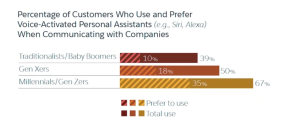Nowadays, people want information quickly. With the rise of Alexa, Google Assistant, and Siri, it’s easier and faster to use voice search instead of typing. These days, about 20% of all internet searches are done with voice search so it’s gaining significance in SEO strategy. Voice search is growing more popular, so it’s important for businesses to accommodate to this new technology to maintain their website’s relevance in an ever-changing market.
Contents
What is Voice Search and Voice Search Optimization?
Voice search is a new feature that allows users to verbally say their query out loud to their smartphone or smart assistant. The device’s microphone picks up user speech and searches the term. It’s a hands-free method of internet searching, making it convenient when driving, cooking, or when you’re otherwise unable to type a question into Google.
Voice search optimization means a website is optimized and compatible with voice search devices to appear in search results. This means adjusting your business’ SEO strategy to get your page ranked in voice search engines.

When it comes to communicating with companies, voice search assistants are popular with younger demographics.
In general, voice searches are more like casual, conversational speech than typed searches and will include more long tail keywords. The questions people might say out loud to their smart device will be different than what they type out into a search bar. Even more important in voice searches is the fact that people want quick answers—they don’t want a long set of instructions or complex explanations. They’re looking for a clear, direct answer to their query.
Why Is Voice Search Important?
Voice search is gaining relevance as Google’s “near me” feature grows in popularity. Google will give customized, specific suggestions depending on the user’s location. If a user searches for “burgers near me” it will give back a list of restaurants that serve burgers near their location. Voice search is especially relevant for local SEO, so optimizing for this is a way to make sure your business is ranking in Google when people search for certain queries relating to their geographic area.
How are Voice Search Queries Different?
Each algorithm is unique for voice search. However, Google has divided voice queries into four main categories: informational, navigational, actionable, or transactional. According to this broad rule, searchers will be looking for answers to questions, directions, activities, and how-to content, or products and services.
In general, Google likes shorter, concise answers to voice search queries with the average voice search result being only 29 words long. This means that your pages should have the answer to queries in the first 100 or so words so voice search devices will pick up on it.
How You Can Optimize Your Site for Voice Search
Conversational Language and Mobile-Optimized Websites
The best way to cater to voice search devices is to use conversational language and longtail keywords on your website. Don’t zero in on a single key phrase, instead focus on long strings of words or specific search questions and queries. Because people use different wordings when completing a search via voice search, writing similarly to how someone might speak caters to voice search algorithms.

Longtail keywords are more conversational and have a higher rate of conversion. What you trade in for quantity of searches, you get back with more people who are genuinely interested in your product.
Further, cater to voice search queries by ensuring your website is optimized for mobile platforms. These days, everyone uses their phones to search the internet and practically every smartphone has voice search capabilities. This means there is a huge available population that can use voice search for their queries. Since at least one in five searches is voice searches, your SEO strategy should take this into account. Mobile-friendliness is a must.
Webpages that are Easy to Read by Algorithms
Websites should also ensure their content is easily scannable by search engine algorithms. Organized paragraphs, simple sentences, bold headers, and blank spaces will go a long way for webpage readability. These things are also all great for mobile platforms. It’s also beneficial to include FAQ pages of who, what, when, why, and how queries that users might. This helps get your page to rank.
Make sure to incorporate accurate answers to potential queries within your webpage. As a rule, include a succinct answer to the question within the first 100 words on the page. You can use the rest of the page for more detailed content on the topic and rank for relevant keywords. This way, you are still giving a short answer for those who want an answer fast.
Finally, if you want a more involved way to ensure voice search algorithms can read your site, consider using microdata. Microdata tags relevant information, telling search engines about different bits of information on your site by labeling portions of your content. Search engines highlight and read this content and use it to help answer search queries. Microdata can help a search engine determine which chunk of text is an address, phone number, or user review.
Conclusion
The changes voice search is bringing to how users search the internet directly impacts a website’s SEO strategy. With these new trends, websites need to adapt to the ever-evolving challenge of staying relevant on the internet.


